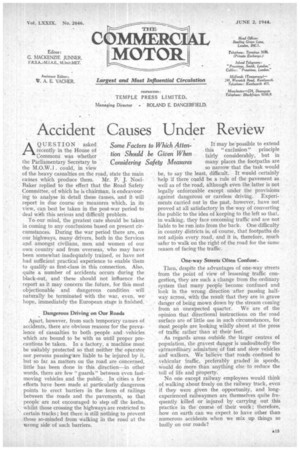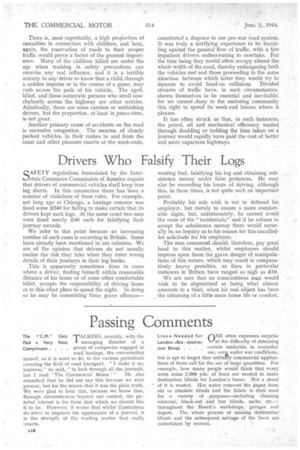Accident Causes Under Review A QUESTION asked recently in the House
Page 17

Page 18

If you've noticed an error in this article please click here to report it so we can fix it.
of Some Factors to Which Alien Commons was whether tion Should be Given When the Parliamentary Secretary to Considering Safety
Measures
the M.O.W. I . could, in .view of the heavy casualties on the road, state the main causes whiCh produce them. Mr. P. J. NoelBaker replied to the effect that the Road Safety Committee, of which he is chairman, is endeavouring to analyse in detail these eauses, arid it will report in due course on measures which, in its view, can best be taken in the post-war period to deal with this serious and difficult problem.
To. our mind the greatest care should be taken in coming to any conclusions based on present circumstances. During the war period there are,, on our highways, Many drivers, both in the Services and amongst civilians, men and women of our own country and from overseas, who may have been somewhat inadequately trained, or have not had sufficient practical experience to enable them to qualify as first-class in this connection. Also, quite a number of accidents occurs during the black-out, and these should not influence the • report as it may concern the future, for this most objectionable and dangerous condition will naturally be terminated with the war, even, we hope, immediately the European stage is finished.
Dangerous Driving on Our Roads Apart, however, from such temporary causes of accidents,there are obvious reasons for the prevalence of casualties to both people and vehicles which are bound to be with us until proper precautions be taken. In a factory, a machine must be suitably protected so that neither the operator nor persons passing•are liable to be injured by it but so far as matters on the road are concerned, little has been done in this direction—in other words, there are few "guards" between even fastmoving vehicles and the public. In cities a few efforts have been made at particularly dangerous points to erect barriers in the form of railings between the roads and the pavements, so that people are not encouraged to step off the kerbs, whilst those crossing the highways are restricted to certain tracks; but there is still nothing to prevent those so-minded from walking in the road at the wrong side of such barriers. It may be possible to extend . this "exclusion" principle fairly considerably, but in many places the footpaths are so narrow that the task would be, to say the least, difficult. It would certainly help if there co.uld be a rule of the pavement as well as of the road, although even the latter is not legally enforceable except under the provisions against dangerous or careless driving. Experiments Carried out in the past, however, have not proved at all satisfactory in the way of converting the public to the idea of keeping to the left so that, in walking, they face oncoming traffic and are not liable to be run into from the back. One difficulty in country districts is, of course, that footpaths do not adjoin every road, and it is, therefore, much safer to walk on the right of the road for the same reason of facing the traffic.
Measures
One-way Streets Often Confuse Then, despite the advantages of one-way streets from the point of view of lessening traffic congestion, they are such a change from the ordinary system that many people become confused and look in the wrong direction after passing halfway across, with the result that they are in grave danger of being mown down by the stream coming from an unexpected quarter. We are cif the opinion that directional instructions on the road surface are of little use in such circumstances, for most people are looking wildly about at the press of traffic rather than at their feet.
As regards areas outside the larger centres of population, the gravest danger is undoubtedly the eidraordinary admixture Of fast and slow vehicles and walkers. We believe that roads confined to vehicular traffic, preferably graded in speeds, NN.ould do more than anything else to reduce the toll of life and property.
No one except railway employees would think of walking about freely on the railway track, even if they were given the opportunity, and longexperienced railwaymen are themselves quite frequently killed or injured by carrying out this practice in the course of their work ; therefore, how on earth can we expect to have other than numerous accidents when we mix up things so badly on our roads? There is, most regrettably, a high proPortion of casualties in connection with children, and here, again, the reservation of roads to their proper traffic would prove a factor of the greatest importance. Many of the children killed are under the age when training in safety precautions can exercise any real influence, and it is a terrible anxiety to any driver to know that a child, through a sudden impulse or in the course of a game, may rush across the path of his vehicle. The aged, blind, and those autocratic persons who stroll nonchalantly across the highway are other worries. Admittedly, there are some careless or unthinking drivers, but the proportion, at least in peace-time, is not great.
Another primary cause of accidents on the road is excessive congestion. The swarms of closely packed vehicles, in their rushes to and from the coast and other pleasure resorts at the week-ends, constituted a disgrace to our pre-war road system. It was truly a terrifying experience to be travelling against the general flow of traffic, with a few impatient drivers endeavouring to overtake. For the time being they would often occupy almost the whole width of the road, thereby endangering both the vehicles met and those proceeding in the same direction between which latter they would try to Squeeze to avoid head-on collisions Divided streams of traffic have, in such circumstances, shown themselves to be essential and inevitable", for we cannot ,deny to the motoring community this right to spend its week-end leisure where it pleases.
It has often struck usthat, in such instances, • the petrol, oil and mechanical efficiency wasted through doubling or trebling the time taken on a journey would rapidly have paid the cost of better and more capacious highways.




















































